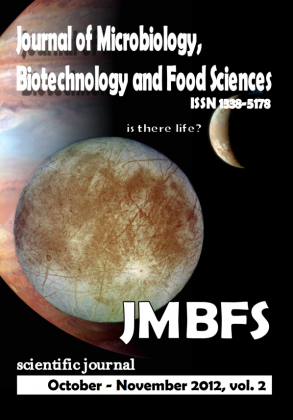INFLUENCE OF PETROCHEMICAL INDUSTRY ENVIRONMENTAL CONTAMINANTS ON ANIMAL OVARIAN CELLS
Keywords:
benzene, toluene, xylen, ovarian, proliferation, apoptosis, hormoneAbstract
The aim of our studies was to examine (1) the effect of environmental contaminants (benzene, toluene and xylen) on basic ovarian cell functions (proliferation, apoptosis, secretory activity) in different animal species (rabbit, pig, cow), and (2) whether gonadotropic hormone (FSH) and plant molecules (quercetin, resveratrol or extract of yucca) can affect these functions and modify effect of environmental contaminants.It was observed, that the culture of either porcine or bovine ovarian cells with benzene, toluene or xylen promote apoptosis (accumulation of apoptosis markers bax and p53) and proliferation (accumulation of PCNA). Furthermore, additions of these contaminants were able either up- or down-regulate the release of progesterone, oxytocin, insulin-like growth factor I (IGF-I) and prostaglandin F by cultured porcine, rabbit and bovine ovarian cells and their response to addition of FSH. FSH additions promoted proliferation, apoptosis and release of molecules listed above by porcine granulosa cells. Moreover, FSH was able to modify and to prevent. Some effects of BTEX on these cells. The effects of either quercetin or resveratrol on basic porcine ovarian cell functions were observed, but these plant molecules were not able to prevent BTEX effect. Feeding of rabbits with yucca extract caused changes in release of progesterone, IGF-I and prostaglandin F by their ovarian cells, as well as to modify and prevent the influence of benzene on ovarian hormone release.
The obtained data suggest that (1) the negative effect of BTEX on reproduction can be due to their influence on ovarian cell apoptosis, proliferation, turnover and release of peptide and steroid hormones and growth factors, and that (2) FSH and plant molecules can regulate ovarian cell functions and prevent some effects of BTEX on these cells.
Downloads
Download data is not yet available.
Downloads
Published
2012-10-01
How to Cite
V. Sirotkin, A., Kotwica, J., Chrenek, P., Kolesárová, A., V. Makarevich, A., Harrath, A., Baková, Z., Baláži, A., Kádasi, A., & Tóth, T. (2012). INFLUENCE OF PETROCHEMICAL INDUSTRY ENVIRONMENTAL CONTAMINANTS ON ANIMAL OVARIAN CELLS. Journal of Microbiology, Biotechnology and Food Sciences, 2(2), 517–525. Retrieved from https://office2.jmbfs.org/index.php/JMBFS/article/view/7160
Issue
Section
Biotechnology
License
Copyright (c) 2012 Alexander V. Sirotkin, Attila Kádasi, Andrej Baláži, Zuzana Baková, A.Halim Harrath, Alexander V. Makarevich, Adriana Kolesárová, Peter Chrenek, Jan Kotwica, Tomáš Tóth

This work is licensed under a Creative Commons Attribution 4.0 International License.
All papers published in the Journal of Microbiology, Biotechnology and Food Sciences are published under a CC-BY licence (CC-BY 4.0). Published materials can be shared (copy and redistribute the material in any medium or format) and adapted (remix, transform, and build upon the material for any purpose, even commercially) with specifying the author(s).

